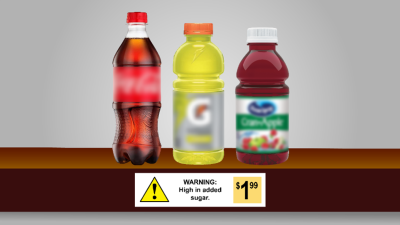Price tag messaging can amplify the benefit of taxes
January 9, 2024
By Rachel Morrow, Gillings Communications Fellow
Empowering consumers to make informed decisions is essential in improving the health of communities. While excise taxes — or taxes on specific items — are effective in promoting healthier behaviors, researchers at the UNC Gillings School of Global Public Health found that added messaging on price tags further discourages parents from wanting to buy sugary drinks for their children.
Currently, seven United States cities and the Navajo Nation have taxes on sugary drinks, yet all label the drinks with a standard price tag displaying a tax-inclusive price and no additional messages or label requirements. Evidence shows that following the implementation of sugary taxes in the U.S., the demand for sugary drinks reduced by 20%.
However, researchers at the Gillings School wondered how communicating either the price increase from the tax or the high sugar content through price tags might further empower healthy decision-making.

Dr. Marissa Hall
Marissa Hall, PhD, assistant professor in the Department of Health Behavior and first author of the paper, acknowledged that “even though this policy hasn’t been implemented yet, public health lawyers think it should be legally feasible for policymakers to enact price tag requirements in conjunction with an excise tax on sugary drinks.”
Knowing that excise taxes are an effective policy in promoting healthy behavior, this research exemplifies the way that messaging on price tags can further promote healthy choices.
Past studies have displayed that signaling the price increases on the price tag or menu amplifies the impact of the increase on consumer behaviors, further reducing the number of people who purchase sugary drinks. Yet, studies have not tested a range of price tag labeling options or icons.
To fill this gap in research, this study examined the impact of enhanced labels on both the decision-making process and the decision itself through eight different messages and the presence (or absence) of a yellow icon label.

An illustration of a warning label and price underneath sugary drinks.
The study found that all types of enhanced price tags discouraged parents from wanting to buy sugary drinks for their children compared to the standard price tags. Messages about taxes on price tags could reduce purchases of unhealthy products, enabling more health benefits.
As policymakers add excise taxes, they should consider mandating enhanced price tags to maximize the public health benefits of taxes to consumers.

Dr. Lindsey Smith Taillie
The findings also have global implications. Co-author on the study, Lindsey Smith Taillie, PhD, associate professor in the Department of Nutrition, said, “Over fifty countries around the world have implemented national sugary drinks taxes. These results suggest a possible option for strengthening those taxes and increasing public health benefits from reducing sugary drink consumption.”
Looking ahead into the future, Hall notes that “In this research, we looked at the potential impact of the label messaging in conjunction with the tax, but I think what we don’t know yet is how this translates into real-world shopping behaviors. That would be something we would hope to test in the future.”
Contact the UNC Gillings School of Global Public Health Communications Team at sphcomm@unc.edu.
